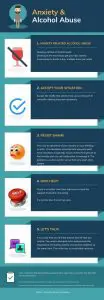Everyone knows the standard rationale for drinking alcohol when you feel stressed. “It takes the edge off.” When you’re talking about occasional stress, this is not automatically a dangerous choice. If you’re talking about an anxiety disorder, well, welcome to a very slippery slope.
At any given time, as many as 40 million Americans are struggling with an anxiety disorder. About 20 percent of them use alcohol to manage their anxiety symptoms. On a parallel track, 20 percent of those with an alcohol use disorder also are also dealing with an anxiety disorder. The connections exist and must be respected.
Anxiety, Alcohol, and the Central Nervous System
Anxiety sends the central nervous system into high alert. Alcohol depresses the central nervous system. Anxiety is sometimes treated with medications that are central nervous system depressants. Alcohol has a very similar sedative effect. After one drink — or even after one sip — you may feel like you’ve discovered the secret formula for controlling your anxiety. This is the underlying cycle of such self-medication.
Unfortunately, alcohol can both cause anxiety and escalate your current anxiety symptoms. It tampers with the levels of certain neurotransmitters in your brain. This is a recipe for heightened anxiety. Once the alcohol wears off, you may find that your anxiety is worse than it was when you took that first sip. This is called alcohol-induced anxiety. Keep this cycle going long enough and you may no longer remember which came first: the anxiety disorder or the alcohol abuse.
A Few Signs of Anxiety-Related Alcohol Dependence
- Needing alcohol to get through social events
- Drinking at every get-together or gathering
- Having a drink in the morning to “get your day started”
- Consuming five more alcoholic beverages in a day
- Maintaining that pace of five or more drinks for four or more days per week
- Realizing that you can’t stop “any time you want.”
Anxiety Disorder Lead to Alcohol Abuse: What to Do Now
Accept Your Situation
It’s easy and common for someone to downplay their anxiety symptoms and their dependence on alcohol. You might even convince yourself that your approach is working. You sometimes get anxious but it’s nothing that a drink (or five) can’t control. Please accept the reality that this belief has you on the path to some life-altering long-term problems. The sooner you seek help, the faster you can make the much-needed changes.
Resist Shame
You may be ashamed of your anxiety or your drinking — or both. It could be a source of embarrassment to admit that you need help. Therapy might be something you never imagined you would need. It is absolutely essential that you push past these emotions to get help. You’re not the first person to feel anxiety and use self-medication to manage it. The looming problems you face are far worse than any short-term shame.
Contact a Health Professional
There is no better time than right now to seek the support of anxiety counseling. It’s not too late. It’s not too soon. Once you’ve shared your situation with a therapist, they can guide you to one of many effective treatment options. It may involve medication. It may involve individual and/or group therapy. But there is a proven path to recovery.
Read More
Here’s a good article about Anxiety and Alcohol from healthline.com: Alcohol and Anxiety
Let’s Talk
It is crucial that you find the precise kind of help you require. You need a therapist who understands the importance of treating anxiety and alcohol addiction at the same time. This is the key to sustainable recovery.
We invite you to reach out today to set up a free and confidential consultation with Self Care Impact Counseling. Let’s connect and talk about anxiety counseling. Once again, there is no better time than right now to seek support.
Getting Started With Anxiety Counseling in the Denver area
We invite you to call us at 720-551-4553 for a free 20-minute phone consultation. You can schedule your appointment via phone, email, or the contact page on our website. We offer both in-person and online anxiety counseling. We’re open to whichever option you feel more comfortable with. We look forward to hearing from you!
Self Care Impact Counseling envisions a new age of counseling for adolescents, adults, couples & groups that makes a REAL difference with core values of GROWTH | BALANCE | COMPASSION | INNER HARMONY.

